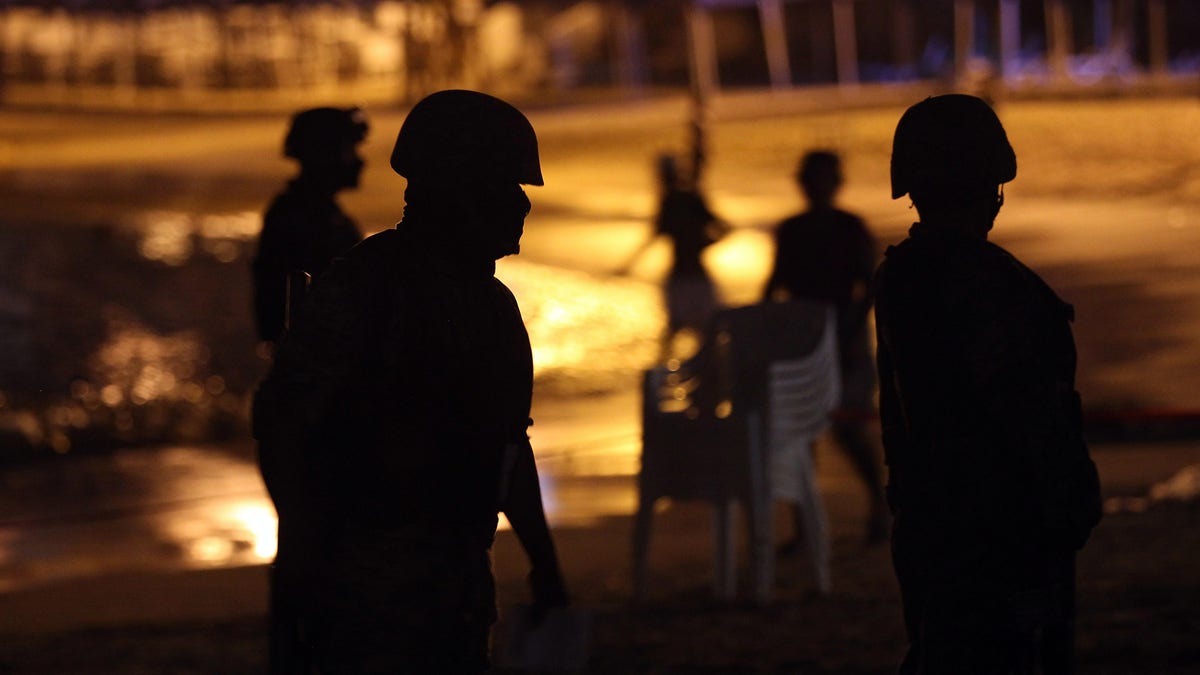
ACAPULCO, MEXICO - MARCH 04: Mexican soldiers stand guard at the site of a suspected drug-related execution on Acapulco's famous Caleta Beach on March 4, 2012 in Acapulco, Mexico. Drug violence has surged in the coastal resort in the last year, making Acapulco the second most deadly city in Mexico after Juarez. One of Mexico's top tourist destinations, Acapulco has suffered a drop in business, especially from foreign tourists, due to the violence. Toursim accounts for about 70 percent of the economy of Acapulco's state of Guerrero and 9 percent of Mexico's economy. (Photo by John Moore/Getty Images) (2012 Getty Images)
MEXICO CITY (AP) – The United Nations' top human rights official is calling on the Mexican government to set a timetable for withdrawing military personnel from law enforcement duties and replacing them with well-trained police.
U.N. High Commissioner for Human Rights Zeid Raad al-Hussein said Wednesday that the government should return soldiers to their barracks because military forces aren't designed to do police work.
It "has to be driven by a sense of real urgency, real urgency. It's not something that can wait endless months," he said.
Zeid said Mexico's defense secretary, Gen. Salvador Cienfuegos, had told him the army doesn't desire a policing role.
"He was very frank about the fact that he didn't enjoy the fact that he had been dragged into" policing work, Zeid said. "No military ... wants to de policing functions. The military is designed for something else."
But Zeid added that better police forces have to be trained before Mexico's army withdraws or the military will leave a vacuum.
Mexican soldiers and marines began leading the fight against cartels after many police units proved too corrupt or inefficient to take them on.
But soldiers have been accused of human rights abuses, including a 2014 case in which three soldiers were charged with homicide in the slaying of at least eight suspects after they surrendered. A separate government human rights investigation concluded 12 to 15 suspects had been killed after surrendering and said the crime scene was altered.
Charges were dismissed last week against four other soldiers accused of covering up or failing to report the killings. Federal prosecutors said they have appealed that decision, in hopes of re-instating the charges.
"We have said we will watch this case very carefully," Zeid said.
He also called on Mexico to abide by the recommendation of an Inter-American human rights commission group calling for a re-examination of the case of 43 college students who disappeared after a confrontation with police a year ago and are presumed dead. Government prosecutors concluded the young men were killed and incinerated by a drug gang, but the commission disputed that finding and said other leads should be followed.
While corrupt local police, not soldiers, are accused of helping the drug gang in that case, independent experts and the students' parents have demanded to talk to soldiers about why they didn't intervene. Cienfuegos has stridently refused to have his soldiers testify about that case to anyone but Mexican prosecutors.
In a statement, the Foreign Relations Department said that "the Mexican government agrees with the high commissioner that all of us authorities on the state, federal and local levels should improve our efforts to protect human rights."
The Defense Department issued a statement saying its officials "expressed the commitment of the Defense Department and the Navy to attend to any human rights issues that domestic and international organizations request attention for."
The statement added that the department described to Zeid "the actions that have been taken to strengthen the culture of respect for human rights" in the armed forces.
Zeid was scathing in his assessment of how Mexico's police, judicial and investigative system have failed Mexicans, leading to 26,000 disappearances and thousands of killings that remain unsolved.
"No one in Mexico can feel safe," Zeid said. "They're not enjoying the protection of the law."
